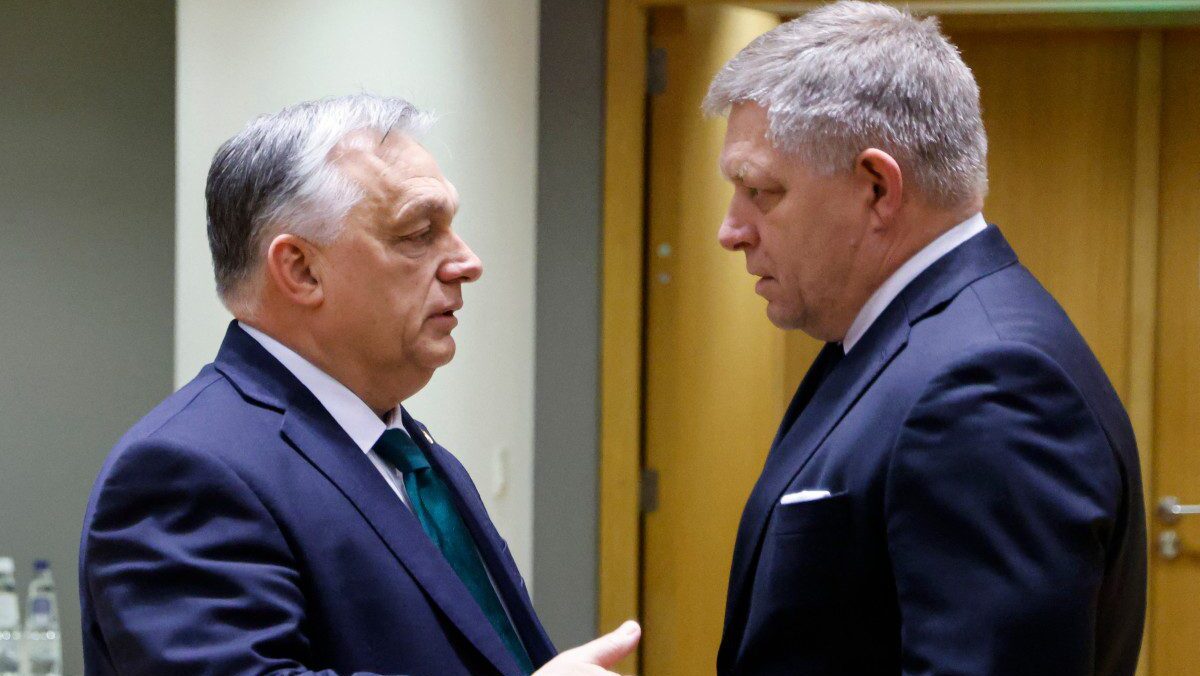
Hungary’s Prime Minister Viktor Orban (L) speaks with Slovakia’s Prime Minister Robert Fico prior to the start of a European Council meeting at the European headquarters in Brussels, on February 1, 2024
Photo: Ludovic MARIN / AFP
Slovakia dismantled its special prosecutor’s office on Wednesday, March 20th, in what is seen by Brussels Eurocrats as a violation of the ‘rule of law.’ Critics of the move are eager to punish Robert Fico’s government for its sovereigntist, pro-peace talks, and anti-immigration stance.
Fico, who was returned to power for a fourth time in October, has angered the Western liberal elites in Europe for taking a similar stance to his Hungarian counterpart Viktor Orbán on a number of issues. He has criticised pro-migration policies, EU-federalisation attempts, transgenderism, the woke culture, and sanctions against Russia, while calling for peace negotiations to end the war in Ukraine.
This rhetoric has not gone down well in Brussels, where the European Parliament adopted a January resolution condemning the nationalist government of Slovakia for modifying the country’s criminal code, including abolishing the special prosecutor’s office, which investigated corruption cases. Fico and his allies have claimed that the office—led by his political foe, former justice minister Daniel Lipšic—was being misused by the previous government to clamp down on its rivals.
As Katarína Roth Neveďalová, a Member of the European Parliament for the governing Slovakian party Smer recently told The European Conservative in an interview:
When my party was in opposition, the then-government was openly saying they would hunt down the opposition leaders. They prosecuted several opposition leaders for criminal activities, but nothing was proven, and one by one they were cleared by the courts. The special prosecutor’s office was politically biassed.
At the time, EU institutions appreciated the special prosecutor’s office from a ‘rule-of-law’ point of view, but with it gone, they are now attacking both Fico and his party, Smer. According to a letter written by the European Commission and seen by Reuters, Brussels warned Slovakia’s justice minister that the criminal law overhaul would have “a direct and significant negative impact on EU law and the Union’s financial interests,” which could possibly mean ‘rule-of-law’ procedures being launched and Slovakia’s EU funds frozen. The same tactic was deployed against the dissenting conservative governments of Hungary and Poland; now Bratislava is in the firing line.
A national EU diplomat told Reuters that no immediate procedures were expected against Slovakia: “It would be premature to go ahead with any major punitive steps. Currently, we don’t see Slovakia as a major problem in foreign affairs, as regards handling Ukraine for example,” the diplomat said. Although Fico has criticised the EU policy on Ukraine and Russian sanctions, he has not blocked any major decisions in the European Council regarding Ukraine.
Liberals in Slovakia and the EU are also annoyed by the Bratislava government’s decision to replace the public radio and television broadcaster with a new organisation, and appoint new leaders. Culture minister Martina Šimkovičová said the changes are needed because the current broadcaster is biassed and gives space only to mainstream views and censors the others. EU scrutiny of Smer contrasts with the recent sympathetic treatment of the new leftist-centrist Polish government, which led an aggressive takeover of the country’s public broadcaster.
The opposition in Slovakia has been organising a series of protests against the government, the latest one last Friday, and the country’s president, Zuzana Čaputová, has also been a harsh critic of Fico. Despite being eligible, Čaputová is not running in the presidential election, with the first round of voting to take place this Saturday. Although the office is largely a ceremonial role, it is a current focus of the battle between anti-globalist and EU-conformist forces. The two main contenders—seen as likely to go through to the second round—are former prime minister Peter Pellegrini, a coalition ally of Fico, and liberal foreign minister of the previous government Ivan Korčok, a keen Hungary-basher. According to opinion polls, Pellegrini and Korčok are neck-and-neck in both the first and second round.
Slovakia (Presidential run-off election), NMS poll:
— Europe Elects (@EuropeElects) March 20, 2024
Pellegrini (Hlas-S&D): 51% (-1)
Korčok (*): 49% (+1)
Pellegrini (Hlas-S&D): 65% (-6)
Harabin (*): 35% (+6)
Korčok (*): 58% (-1)
Harabin (*): 42% (+1)
+/- vs. 14-18 February 2024
Fieldwork: 13-18 March 2024
Sample size:… pic.twitter.com/cdzdBzaPbb
